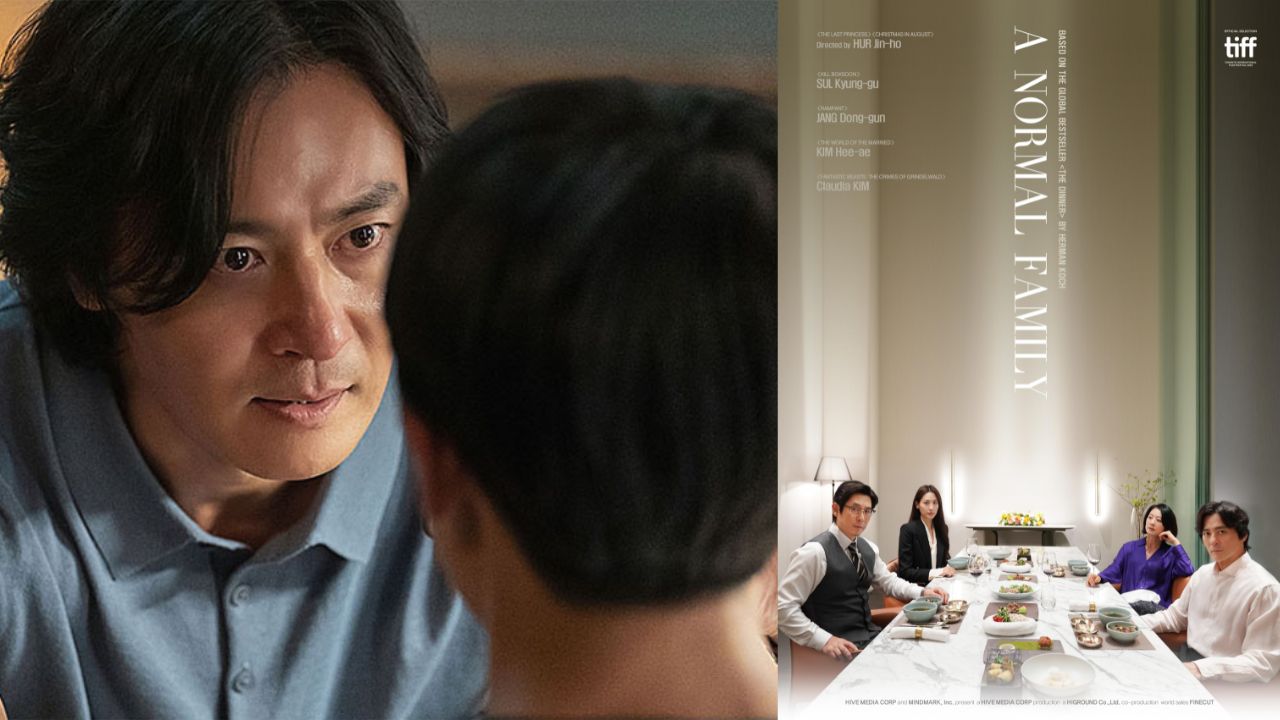Introduction In A Normal Family (2024), director Hur Jin-ho presents a gripping moral drama that navigates the fragile boundaries between right and wrong, familial loyalty, and justice. The film, adapted from Herman Koch’s novel The Dinner, takes a close look at the lives of two brothers—Jae-wan, a ruthless lawyer, and Jae-gyu, an ethical pediatrician—whose moral compasses are tested when their children become involved in a tragic accident. Through meticulously layered characters and an engaging plot, Hur weaves a complex narrative that compels the audience to question the nature of morality, familial bonds, and the extent to which one will go to protect their loved ones.
Plot Overview
The film opens with an intense road-rage incident involving a reckless young man in a luxury car, who fatally strikes a pedestrian and leaves a six-year-old girl critically injured. Jae-wan (Sul Kyung-gu), a high-profile lawyer, is assigned to defend the rich culprit. Simultaneously, the injured girl is treated by Jae-wan’s brother, Jae-gyu (Jang Dong-gun), an idealistic doctor committed to saving lives. As the investigation progresses, Jae-wan and Jae-gyu find themselves in opposing roles in the case—one defending the guilty, the other saving the innocent.
The plot thickens when their teenage children—Jae-wan’s daughter Hye-yoon and Jae-gyu’s bullied son Si-ho—become involved in an equally heinous crime. A viral video reveals them assaulting a homeless man, putting the brothers in an even deeper moral dilemma. Should they shield their children from the law or let them face the consequences?
Character Analysis
The film excels in its portrayal of morally conflicted characters who must grapple with the consequences of their actions.
- Jae-wan (Sul Kyung-gu): As the elder brother and a high-powered attorney, Jae-wan is portrayed as pragmatic, morally flexible, and deeply invested in his own success. His career defending criminals paints him as someone who prioritizes wealth and status over ethics. However, as the story unfolds, cracks appear in his seemingly heartless demeanor, forcing him to reconsider his values, especially when his own daughter’s involvement in a crime comes to light.
- Jae-gyu (Jang Dong-gun): The younger brother is a stark contrast to Jae-wan. As a dedicated pediatrician, Jae-gyu is the moral center of the film, often going beyond his duties to help those in need. Yet, when faced with his son’s participation in a crime, even his strong ethical principles are tested. The film’s brilliance lies in showing that even the most righteous individuals have their breaking points.
- Ji-su (Claudia Kim) and Yeon-kyung (Hee-ae Kim): The wives of the two brothers play crucial roles in amplifying the story’s emotional depth. Ji-su, the younger trophy wife, appears to be superficial at first, but reveals layers of insecurity and hidden strength as the drama unfolds. Yeon-kyung, the social volunteer and Jae-gyu’s wife, similarly grapples with her morality, balancing her desire for justice with her protective instincts as a mother.
Visual and Cinematography
Visually, A Normal Family is a treat. Shot in widescreen format, the film captures the stark contrast between the opulence of Jae-wan’s life and the more grounded, ethical world of Jae-gyu. The cinematography highlights these opposing lifestyles through color contrasts, with Jae-wan’s scenes bathed in colder, more sterile tones, and Jae-gyu’s moments filmed in warmer, more compassionate hues.
The slick and polished visuals complement the moral ambiguity of the story. The use of cityscapes, opulent restaurants, and sterile hospital environments reflects the external appearances of the characters’ lives, which slowly unravel to reveal deeper conflicts. This contrast plays a crucial role in illustrating the thematic duality at the heart of the film.
Themes and Messages
At its core, A Normal Family is a powerful exploration of moral ambiguity and the conflicts that arise when familial loyalty is tested. The film asks difficult questions about justice, the boundaries of right and wrong, and how far one would go to protect their loved ones—even at the cost of personal integrity.
The central theme revolves around the dichotomy of nature versus nurture. Are people born inherently good or evil, or do circumstances shape their behavior? The film masterfully navigates this question through the actions of Jae-wan and Jae-gyu, as well as their children. The film also challenges societal notions of a “normal family.” The title itself is ironic, as the families in the film are anything but typical. Instead, they represent a microcosm of the darker side of human nature, where appearances are deceiving, and moral compromises are commonplace.
Comparison to Other Films
The Dinner (2017), the American adaptation of the same novel, focused heavily on dialogue and moral conflict, with much of the action taking place in one location. In contrast, Hur Jin-ho’s A Normal Family takes a more dynamic approach by expanding the narrative beyond a single setting and infusing the plot with distinctly Korean societal elements, such as the emphasis on family honor and the hierarchical nature of Korean society.
Films like A Sun (2019), a Taiwanese drama that similarly explores familial tensions and moral ambiguity, offer a compelling comparison. Both films begin with shocking events and unravel the moral complexities of their characters as the plot progresses, leaving the audience questioning the nature of justice and the limits of personal responsibility.
Direction and Conclusion
Hur Jin-ho’s direction in A Normal Family is sharp and nuanced, balancing intense emotional drama with moments of dark humor. His previous work in romantic dramas adds a layer of emotional depth to the characters, making their struggles feel both relatable and painful to watch. The script, co-written by Park Eun-kyo and Park Joon-seok, carefully avoids melodrama, instead focusing on the slow unraveling of each character’s moral compass.
Final Verdict:
- A Normal Family is an intense, thought-provoking film that delves deep into the gray areas of morality and justice. The film’s complex characters, stunning cinematography, and powerful themes make it a must-watch for fans of morally ambiguous dramas. Hur Jin-ho masterfully steers the narrative, ensuring that the audience remains engaged and constantly questions their own moral boundaries.
- Recommendation: If you enjoy films that challenge your perception of right and wrong, A Normal Family is highly recommended.
Want to watch A Normal Family? Check out where it’s streaming here. For more top-rated films, explore this list.
YouTube Link: Watch the trailer here





